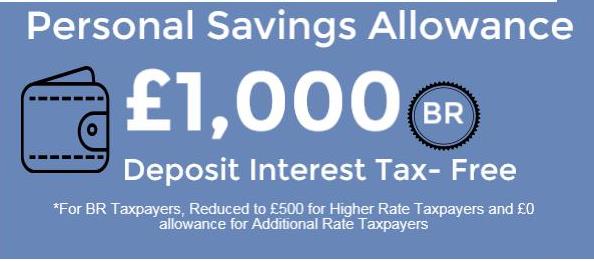Changes to interest on savings- Personal Savings Allowance (PSA)
These changes mean that most people will no longer pay tax on savings interest. Banks and building societies will stop deducting tax from your account interest. If you already receive interest without tax being taken off, you will no longer need to tell your bank or building society that you qualify for tax-free interest.
Savings income includes:
-
Bank and building society interest.
-
Credit Unions, National Savings and Investments.
-
Interest distributions (not dividend) from authorised unit trusts, open-ended investment companies and investment trusts.
-
Income from government and company bonds.
-
Most purchase life annuity payments.
The PSA allowances are:
-
£1,000 for basic rate tax payers
-
£500 for higher rate tax payers
-
£0 for additional rate tax payers

All savers will also have a starting rate band of £5,000
So £6,000 for basic rate tax payers, as long as non-savings income does not exceed £11,000.
Personal Savings Allowance (PSA) rates
|
Income tax rates |
Income band (inc. savings income) |
PSA |
|
0% or 20% |
£0- £17,000 |
No tax to pay |
|
20% |
£17,000 to £43,000 |
£1,000 |
|
40% |
£43,001 to £150,000 |
£500 |
|
45% |
£150,000 + |
No allowance |
As long as you earn less than £1,000 in annual interest (£500 for higher rate tax payers) you do not need to do anything, the bank will pay your income without tax deducted.
Then in this weeks Budget the Treasury announced "an automatic deduction of savings income tax- the government will change the tax rules so that interest from OEICs, authorised unit trusts, investment trust companies and peer-to-peer loans may be paid without deduction of income tax from April 2017."
Receiving distributions without tax deducted means that you will not need to file tax returns simply to claim tax back.
If you exceed your PSA, you will have to pay either 20% or 40% tax on the difference. HMRC will be told by your bank you have gone over the allowance and they may change your tax code to collect the underpayment.
What about ISAs?
Interest from cash ISAs is already paid tax free, so they won’t be affected by the PSA. You should still consider using your ISA allowances in case your income changes or tax legislation changes in the future.
MEPSAHT/120416